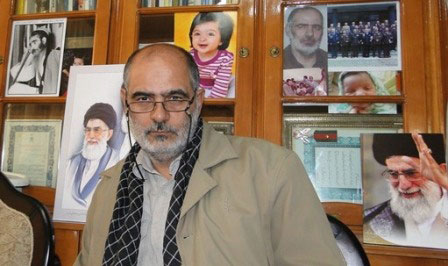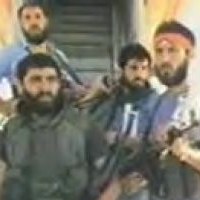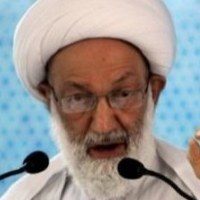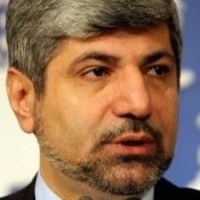![]()
Wed, April 27, 2011 | The Meir Amit Intelligence and Terrorism Information Center
Ansar-e Hezbollah: Recruiting Volunteers for Suicide Missions in Bahrain
From recruitment of suicide bombers to increased online presence: radical right-wing government supporters step up activities.
Hajj Hossein Allah-Karam, one of the founders of the radical Islamic organization Ansar-e Hezbollah, has announced this week the coming launch of recruiting volunteers for suicide missions to help the Bahrainis’ uprising against the regime.
In an interview to Ammariyon (www.ammariyon.ir), a website affiliated with radical circles in the conservative camp, Allah-Karam provided details on the strategy that the Hezbollah Coordination Council, headed by himself, intends to employ to help the “revolutionists” in the region. According to Allah-Karam, the strategy relies on the position of the council, which believes that the government must extend assistance and support to the peoples of Saudi Arabia, Libya, Gaza, Bahrain, and Yemen in their uprisings against their respective regimes.
The strategy consists of four stages: first, organizing processions and distributing memorandums of opinion following Friday prayers in mosques; second, holding demonstrations in front of the embassies of Saudi Arabia and Bahrain; third, creating human chains in Iran’s southern provinces and then in the three islands disputed between Iran and UAE (Abu Musa and the Greater and Lesser Tunbs); fourth, launching flotillas to Bahrain and providing Bahrainis with practical assistance. As part of the strategy, the council will soon begin registering volunteers willing to go to the conflict areas to carry out suicide missions (Ammariyon, April 15).
Hossein Allah-Karam, a former Revolutionary Guards senior officer, is one of the founders and leaders of Ansar Hezbollah, a radical Islamic militia that, mainly in the late 1990s and early 2000s, employed violence against reformists, intellectuals, liberals, and students who opposed the regime.
In September 2005 Allah-Karam expressed support for suicide missions against the West. He claimed that, in light of America’s insistence on maintaining a military option against Iran, there could be no objection to suicide missions, and that dozens of volunteers had already expressed willingness to go on such missions. In 2007 Allah-Karam was made Iran’s military attaché in Croatia.
Hossein Allah-Karam has recently been appointed as member of the central council of a new think tank center established by the Supreme Leader’s supporters, called “Base of Ammar” (Gharargah-e Ammar) or “The Strategic Center of the Leader’s Supporters Front” (Markaz-e Rahbordi-ye Jebhe-ye Ahl-e Velaa’). It is named after Ammar Yasser, who was close to Prophet Muhammad and one of the main supporters of the first imam, Ali bin Abi Taleb. He was killed in the battle of Siffin, which took place between Ali and Muawiyah bin Abi Sufyan, the governor of Syria, in 657 AD.
This week, the conservative Fars News Agency reported that Hojjat-ol-Eslam Mehdi Ta’eb was appointed chief of the center, with Ali-Reza Panahian as his deputy. In an interview granted to the news agency, Panahian said that the center was established in the wake of the riots that broke out after the presidential elections and the Supreme Leader’s message to Iran’s elites to mobilize to prevent the reoccurrence of similar events in the future. Consequently, senior political and cultural personalities held several meetings and came to the conclusion that there was need for coordination between the active cultural forces to contend with Iran’s domestic and foreign enemies and implement the Supreme Leader’s views. According to Panahian, the center’s first general conference was attended by 70 major personalities who had until then acted in different cultural institutions across the country. Members of the center’s central council have been elected recently and a charter defining its main tasks has been approved. The tasks include formulating strategies in the cultural and political spheres, coordinating the forces operating on the cultural and political front of the Islamic revolution, supervising and monitoring the activity of cultural and political bodies and centers, formulating a vision to contend with the “soft war” waged by Iran’s enemies, and identifying the covert and overt activities of Iran’s enemies and their agents inside Iran. Panahian said that further details on the activity of the new center were forthcoming (Fars, April 15).
The 15 members of the central council elected to lead the center include top personalities and major theoreticians affiliated with the radical right wing of the conservative bloc, including Sa’id Qasemi, Hassan Abbasi, and Qasem Ravanbakhsh.
Sa’id Qasemi, a former Revolutionary Guards intelligence officer, is considered one of the most prominent theoreticians on strategy issues among President Ahmadinejad’s advisors. In the past, Qasemi spoke in favor of establishing Iranian resistance cells in Europe as one of the ways to deal with the pressure exerted by the West on Iran. During a convention held during the second Lebanon war (waged between Israel and Hezbollah), attended by volunteers for suicide operations against Israel and the West, Qasemi called to use suicide forces against Israel, saying they were preferable to long-range missiles.
Hassan Abbasi, head of the Revolutionary Guards-affiliated Center for Doctrinal Analysis, is considered one of the major conservative theoreticians. He is believed to be one of the experts who have had considerable influence over President Ahmadinejad’s strategic and defense views. A high-profile proponent of “asymmetrical warfare”, he has stressed the need for using suicide warfare in case of a military attack on Iran’s nuclear facilities. In recent years, Abbasi has become known in Iran and even elsewhere for a series of extremist remarks and strong criticism against senior figures affiliated with the reformist bloc.
The cleric Qasem Ravanbakhsh is a student of ultra-conservative cleric Mohammad-Taqi Mesbah-Yazdi, and the editor-in-chief of the radical conservative weekly Parto-ye Sokhan.
The establishment of the Ammar think tank center reflects the increasing activity of radical circles in the conservative bloc who, over the past year, have joined the campaign against the regime’s opponents and the reformist opposition in light of Iran’s political crisis, which has been escalating since the presidential elections in the summer of 2009. These circles, which came to be called the “Ammariyon Faction” (after Ammar Yasser, one of the supporters of the first Shi’ite imam, Ali Bin Abu Taleb), have built several blogs and websites in recent months to mobilize support for the Supreme Leader, disseminate radical views, and wage a struggle against the regime’s opponents. The following websites and blogs should be noted in the context of this online activity:
— www.ammariyon.ir
— www.mehrabeandishe.blogfa.com
— www.aynaammar.ir
— www.ammargroup.persianblog.ir.



 RSS
RSS











Ansar-e Hezbollah: Recruiting Volunteers for Suicide Missions in #Bahrain | #Iran #Shia #jihadism http://j.mp/lceCoY
Ansar-e Hezbollah: Recruiting Volunteers for Suicide Missions in #Bahrain | #Iran #Shia #jihadism http://j.mp/lceCoY http://ff.im/C73nP
RT @CrethiPlethi: Ansar-e Hezbollah: Recruiting Volunteers for Suicide Missions in #Bahrain | #Iran #Shia #jihadism http://j.mp/lceCoY h …
RT @CrethiPlethi: Ansar-e Hezbollah: Recruiting Volunteers for Suicide Missions in #Bahrain | #Iran #Shia #jihadism http://j.mp/lceCoY
RT @CrethiPlethi: Ansar-e Hezbollah: Recruiting Volunteers for Suicide Missions in #Bahrain | #Iran #Shia #jihadism http://j.mp/lceCoY